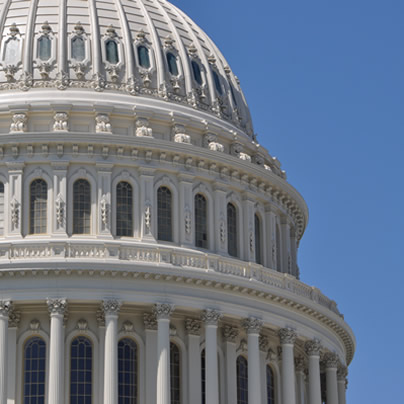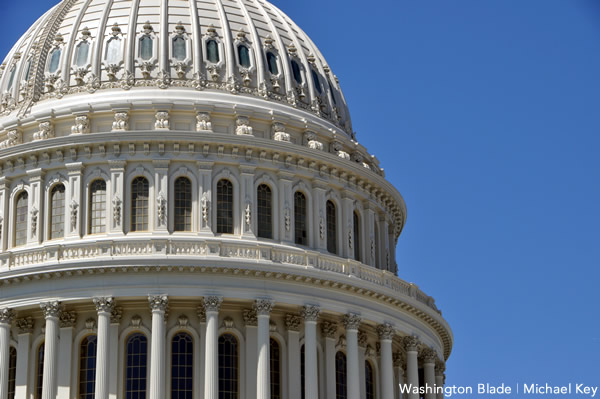Politics
House panel adopts ‘conscience’ amendment to defense bill
Measure puts burden on Pentagon to prove harassment causes ‘actual harm’


A House panel approved an amendment that would make it easier for troops to harass their gay colleagues. (Washington Blade photo by Michael Key)
A House panel on Wednesday approved as part of major defense legislation an amendment that would make it easier for troops to harass their gay comrades without fear of reprisal.
The amendment, introduced by Rep. John Fleming (R-La.), was approved by the Republican-controlled House Armed Services Committee by a vote of 33-26 as part of the fiscal year 2014 defense authorization bill.
Fleming’s measure would expand the “conscience provision” that already exists in defense law. It would protect discriminatory speech and actions and leave commanders with no recourse against prejudicial conduct when it occurs in their units.
Further, the measure requires the Pentagon to implement regulations within 120 days after the bill becomes law. The defense secretary must consult with “official military faith-group representatives who endorse military chaplains” before the regulations are issued.
President Obama signed the existing “conscience provision” under Section 533 as part of the Fiscal Year 2013 Defense Authorization Act. At the time of the signing, Obama called it “unnecessary” and said he was signing the defense package under assurances the Pentagon wouldn’t “permit or condone discriminatory actions that compromise good order and discipline or otherwise violate military codes of conduct.”
LGBT groups expressed disappointment over the adoption of the amendment and said it reflects a continued discontent among those who opposed “Don’t Ask, Don’t Tell” repeal.
Ian Thompson, legislative representative for the American Civil Liberties Union, said “it is disappointing” the House panel approved “this dangerous amendment” as part of the defense authorization bill.
“It is, quite frankly, puzzling why a majority of members on this committee would support a measure that has the potential to make it more difficult for commanders to responsibly deal with problems regarding conduct that undermines longstanding prohibitions against harassment,” Thompson said.
Michael Cole-Schwartz, a spokesperson for the Human Rights Campaign, expressed a similar sentiment.
“Let’s face it — this amendment is simply another attack by those who still oppose the successful repeal of ‘Don’t Ask, Don’t Tell’ and continue to look for ways to allow discrimination in our Armed Forces,” Cole-Schwartz said. “This amendment will expand a standard in the law that could allow religion to serve as a proxy for discrimination which clearly harms unit cohesion and military readiness.”
Allyson Robinson, executive director the LGBT military group OutServe-SLDN and Army veteran, expressed opposition to the amendment because, among other things, the bill would undermine the authority of military commanders.
“This amendment takes an authority this nation has entrusted to commanders in the field since its founding – the authority to exercise appropriate control over their troops’ ‘actions or speech’ to maintain good order and discipline – and puts it in the hands of politicians in Washington,” Robinson said. “As someone who has led soldiers in the field, I can tell you that is an untenable situation.”
According to OutServe-SLDN, Rep. Adam Smith (D-WA), top Democrat on the committee, introduced and withdrew key elements of the Military Spouses Equal Treatment Act (MSET) that would ensure “equal benefits, recognition, and support for all military spouses.”
Given the Republican majority on the panel, the measure would have likely failed if Smith had brought up the measure for a vote.
Robinson said Smith’s action serves a reminder that gay service members are unable to receive many spousal benefits — including health and pension benefits — because of the Defense of Marriage Act.
“This important gesture is a reminder that the families of gay and lesbian service members are still not treated equally and that the repeal of ‘Don’t Ask, Don’t Tell’ did not impact that reality,” Robinson said. “Congressman Smith is a tenacious fighter for equality in our military and for our troops and we are grateful for all his work to that end.”
The Blade will provide a roll call vote on the Fleming amendment soon.
Congress
Congress passes ‘Big, Beautiful Bill’ with massive cuts to health insurance coverage
Roughly 1.8 million LGBTQ Americans rely on Medicaid

The “Big, Beautiful Bill” heads to President Donald Trump’s desk following the vote by the Republican majority in the U.S. House of Representatives Thursday, which saw two nays from GOP members and unified opposition from the entire Democratic caucus.
To partially offset the cost of tax breaks that disproportionately favor the wealthy, the bill contains massive cuts to Medicaid and social safety net programs like food assistance for the poor while adding a projected $3.3 billion to the deficit.
Policy wise, the signature legislation of Trump’s second term rolls back clean energy tax credits passed under the Biden-Harris administration while beefing up funding for defense and border security.
Roughly 13 percent of LGBTQ adults in the U.S., about 1.8 million people, rely on Medicaid as their primary health insurer, compared to seven percent of non-LGBTQ adults, according to the UCLA School of Law’s Williams Institute think tank on sexual orientation and gender identities.
In total, the Congressional Budget Office estimates the cuts will cause more than 10 million Americans to lose their coverage under Medicaid and anywhere from three to five million to lose their care under Affordable Care Act marketplace plans.
A number of Republicans in the House and Senate opposed the bill reasoning that they might face political consequences for taking away access to healthcare for, particularly, low-income Americans who rely on Medicaid. Poorer voters flocked to Trump in last year’s presidential election, exit polls show.
A provision that would have blocked the use of federal funds to reimburse medical care for transgender youth was blocked by the Senate Parliamentarian and ultimately struck from the legislation — reportedly after the first trans member of Congress, U.S. Rep. Sarah McBride (D-Del.) and the first lesbian U.S. senator, Tammy Baldwin (D-Wis.), shored up unified opposition to the proposal among Congressional Democrats.
Congress
Ritchie Torres says he is unlikely to run for NY governor
One poll showed gay Democratic congressman nearly tied with Kathy Hochul

Gay Democratic Congressman Ritchie Torres of New York is unlikely to challenge New York Gov. Kathy Hochul (D) in the state’s next gubernatorial race, he said during an appearance Wednesday on MSNBC’s “Morning Joe.”
“I’m unlikely to run for governor,” he said. ““I feel like the assault that we’ve seen on the social safety net in the Bronx is so unprecedented. It’s so overwhelming that I’m going to keep my focus on Washington, D.C.”
Torres and Hochul were nearly tied in a poll this spring of likely Democratic voters in New York City, fueling speculation that the congressman might run. A Siena College poll, however, found Hochul leading with a wider margin.
Back in D.C., the congressman and his colleagues are unified in their opposition to President Donald Trump’s signature legislation, the “Big Beautiful Bill,” which heads back to the House after passing the Senate by one vote this week.
To pay for tax cuts that disproportionately advantage the ultra-wealthy and large corporations, the president and Congressional Republicans have proposed massive cuts to Medicaid and other social programs.
A provision in the Senate version of the bill that would have blocked the use of federal funds to reimburse medical care for transgender youth was blocked by the Senate Parliamentarian and ultimately struck from the legislation, reportedly after pressure from transgender U.S. Rep. Sarah McBride (D-Del.) and lesbian U.S. Sen. Tammy Baldwin (D-Wis.).
Torres on “Morning Joe” said, “The so-called Big Beautiful Bill represents a betrayal of the working people of America and nowhere more so than in the Bronx,” adding, “It’s going to destabilize every health care provider, every hospital.”
Congress
House Democrats oppose Bessent’s removal of SOGI from discrimination complaint forms
Congressional Equality Caucus sharply criticized move

A letter issued last week by a group of House Democrats objects to Treasury Secretary Scott Bessent’s removal of sexual orientation and gender identity as bases for sex discrimination complaints in several Equal Employment Opportunity forms.
Bessent, who is gay, is the highest ranking openly LGBTQ official in American history and the second out Cabinet member next to Pete Buttigieg, who served as transportation secretary during the Biden-Harris administration.
The signatories to the letter include a few out members of Congress, Congressional Equality Caucus chair and co-chairs Mark Takano (Calif.), Ritchie Torres (N.Y.), and Becca Balint (Vt.), along with U.S. Reps. Nikema Williams (Ga.), Hank Johnson (Ga.), Raja Krishnamoorthi (Ill.), Delia Ramirez (Ill.), Joyce Beatty (Ohio), Lloyd Doggett (Texas), Eleanor Holmes Norton (D.C.), Josh Gottheimer (N.J.), and Sylvia Garcia (D-Texas).
The letter explains the “critical role” played by the EEO given the strictures and limits on how federal employees can find recourse for unlawful workplace discrimination — namely, without the ability to file complaints directly with the Employment Opportunity Commission or otherwise engage with the agency unless the complainant “appeal[s] an agency’s decision following the agency’s investigation or request[s] a hearing before an administrative judge.”
“Your attempt to remove ‘gender identity’ and ‘sexual orientation’ as bases for sex discrimination complaints in numerous Equal Employment Opportunity (EEO) forms will create unnecessary hurdles to employees filing EEO complaints and undermine enforcement of federal employee’s nondiscrimination protections,” the members wrote in their letter.
They further explain the legal basis behind LGBTQ inclusive nondiscrimination protections for federal employees in the EEOC’s decisions in Macy v. Holder (2012) and Baldwin v. Foxx (2015) and the U.S. Supreme Court’s decision in Bostock v. Clayton County (2020).
“It appears that these changes may be an attempt by the department to dissuade employees from reporting gender identity and sexual orientation discrimination,” the lawmakers wrote. “Without forms clearly enumerating gender identity and sexual orientation as forms of sex discrimination, the average employee who experiences these forms of discrimination may see these forms and not realize that the discrimination they experienced was unlawful and something that they can report and seek recourse for.”
“A more alarming view would be that the department no longer plans to fulfill its legal obligations to investigate complaints of gender identity and sexual orientation and ensure its
employees are working in an environment free from these forms of discrimination,” they added.
-

 U.S. Supreme Court1 day ago
U.S. Supreme Court1 day agoSupreme Court to consider bans on trans athletes in school sports
-

 Out & About1 day ago
Out & About1 day agoCelebrate the Fourth of July the gay way!
-

 Maryland4 days ago
Maryland4 days agoSilver Spring holds annual Pride In The Plaza
-

 Opinions4 days ago
Opinions4 days agoSupreme Court decision on opt outs for LGBTQ books in classrooms will likely accelerate censorship












